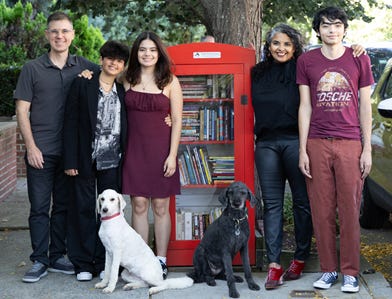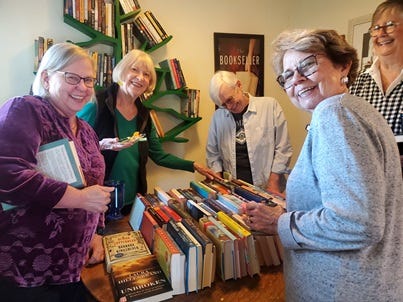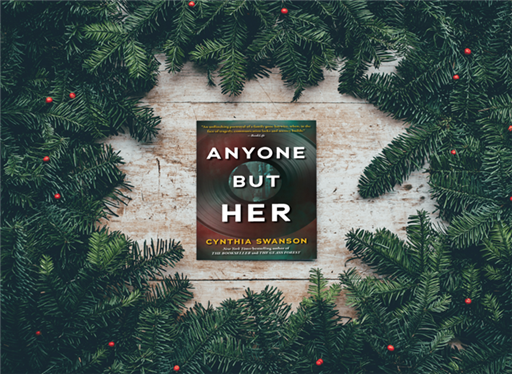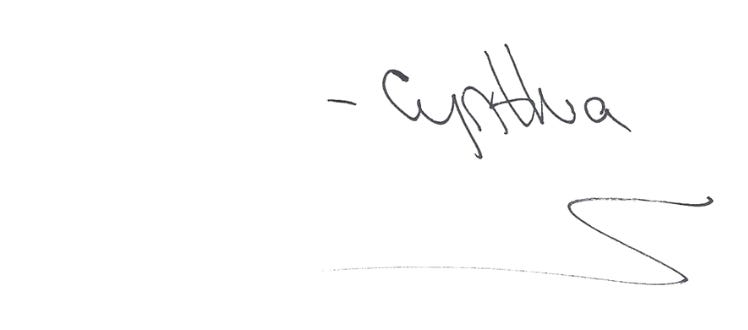I mentioned recently that a current favorite read is Robin Wall Kimmerer’s The Serviceberry: Abundance and Reciprocity in the Natural World. (Incidentally, I’m not the only one. As I was drafting this edition of The What If Journal, I noticed that the book was reviewed in this past Sunday’s New York Times.)
Because I can’t get The Serviceberry’s concepts out of my head, I want to talk about how we can apply these ideas in our lives.
In this brief book (128 pages; you can read it in an afternoon), Kimmerer explains how the serviceberry plant both gives and receives from other living beings and from the earth. In June, the plant’s berries are abundant. But the serviceberry doesn’t hoard its berries. Why would it, when giving them away has so many benefits?
When birds digest the berries, their waste fertilizes the soil upon which the serviceberry plant depends. Being fixed in one place—unable to move to different ground if current conditions become unfertile—the serviceberry plant relies on the birds as much as they rely on it.
This is a true reciprocal arrangement, or what Kimmerer calls a gift economy. She goes on to talk about other gift economies in nature, as well as societies that function using this concept.
Spoiler alert: countries whose economies are based on capitalism are not such societies. In fact, capitalism does the opposite: it artificially creates scarcity and the need to buy that which the earth naturally gives—if only we do our part by protecting and sharing natural resources and the systems that create them.
Bottled water is an example of this. It requires private ownership and hoarding of the best water sources. From these sources, water is harvested, placed in plastic bottles, shipped to stores, and sold for as much money as the bottling company can get for it.
Consumers, for their part, feel little-to-no obligation with regards to purchasing a bottle of water. They paid their hard-earned money for it—and as such, they own it and can do as they please with it. Drink the whole thing, or just take a sip. Reuse/recycle the bottle, or toss it in the street. What difference does it make? Ownership means zero obligation to anyone or anything else—right?
This likely depresses you. (Me, too.) But here’s the thing: while we might be unable to “undo” capitalism, we can create micro gift economies that help offset our overall dependence on the capitalist way of life.
Micro Gift Economies
How does that work? A perfect example is a Little Free Library. Perhaps you have one in your neighborhood. Perhaps you have one in front of your house. (Go, you!)

These wonderful little boxes, with their signs proclaiming “Take a Book! Leave a Book!” make me smile. Out walking, I often pause to browse the latest selections. When I have books to share, I stock my neighborhood LFLs or donate them to a local nonprofit, Bookgive, which distributes free books in the community.

Another example, also book-related: recently, I hosted a holiday book swap. Everyone brought at least 5 - 10 books that were “gift ready”—books in such good condition, participants would happily give them to a loved one as a gift.
Books were set out all over my house, sorted by genre. We sipped mulled cider, enjoyed snacks, browsed the books, and socialized. Everyone went home with new books for themselves or as gifts. The leftovers were donated to Bookgive.
I organized the swap as a fundraiser for my Unitarian-Universalist church—as part of the church’s annual auction, each participant paid a modest sum to attend—but you could do this for free with your book-loving friends.
A further example is book giveaways. Publishers and authors host these through sites like Goodreads, their newsletters, social media, and other sources. (Keep reading if you’re interested in an Anyone But Her giveaway.)
Why Would Authors Give Away Books?
It’s a logical question. When authors give away their books, they make no money. Like everyone else, we need an income in order to pay our bills and keep doing what we do.
But here’s the thing: abundance creates abundance. Authors can both give away and sell their wares. The more we make our books available to readers, the more readers review them, share them with friends, read them in book clubs, and overall increase our visibility—something every author needs.
[Shameless plug: Reviews are greatly appreciated. If you’ve read my recently released novel Anyone But Her, you can review it using the links here. Thank you!]
What Else Can We Give That Doesn’t Cost Money?
My favorite “free” thing to give? Time.
But let’s be honest: time is not free. In fact, it’s our most valuable asset. Time can never be replenished. Other resources might eventually run out (and likely will, unless we change our way of living)—but the one thing we can count on is that our time will indeed end one day, never to be replaced.
That doesn’t mean time should hoarded. In fact, the more we give our time, the more we’re rewarded, in a true reciprocal arrangement.
So how can we give time?
Show up. Your simple presence is a marvelous gift.
Consciously spend time one-on-one with loved ones and in cherished communities, being fully present. (Phones down, please.)
Volunteer where there’s need and you feel a passion to get involved.
Moving into 2025—which I anticipate being a challenging year for many, myself included—I’m committed to giving my time where and when I can. This, I know, will come back to me in the form of good vibes, deeper relationships, and the strongest love.
How are you giving your time? Let me know…I’m inspired by your ideas!
An Audiobook Giveaway
In the spirit of gift economies, I’m giving a free audiobook of Anyone But Her to two subscribers to The What If Journal!
Anyone But Her is my recently released third psychological suspense novel. It tells the story of Suzanne—named for the Leonard Cohen song and adored by her mother, Alex, who is killed during a robbery at Alex’s record store when Suzanne is 14. Both as a teen and later in adulthood, Suzanne searches for clues about unresolved circumstances around Alex’s death. But what happens when she discovers what she thought she wanted to know?
Anyone But Her is narrated by the wonderful Jennifer Pickens. I’ve been listening to it myself, and I love Jennifer’s narration—it’s perfect for the character of Suzanne.
No need to do anything to enter. If you’re a subscriber, you’re automatically eligible. I’ll randomly select two winners and announce them in the next edition of The What If Journal.
Good luck!
Holiday Family and Fun
We’re looking forward to our college-aged sons being home, hosting out-of-town family, and enjoying time together in the coming weeks. We also have a new addition to the family—the excitable but nonetheless soft and adorable Molly, whose presence is indeed a gift.
For many, the holidays are complicated. I encourage you to be kind to yourself and others, stay cozy and comfortable, and don’t overdo it. Give yourself space for whatever you need (which I hope includes reading).
Sending you love, joy, extra time (if only), and the hope for increased reciprocity in the New Year.













I love the book swap idea!
I want to create a LFL in my tiny community. What a great thing! Enjoy your time with your family this holiday. These days fly by so fast!!